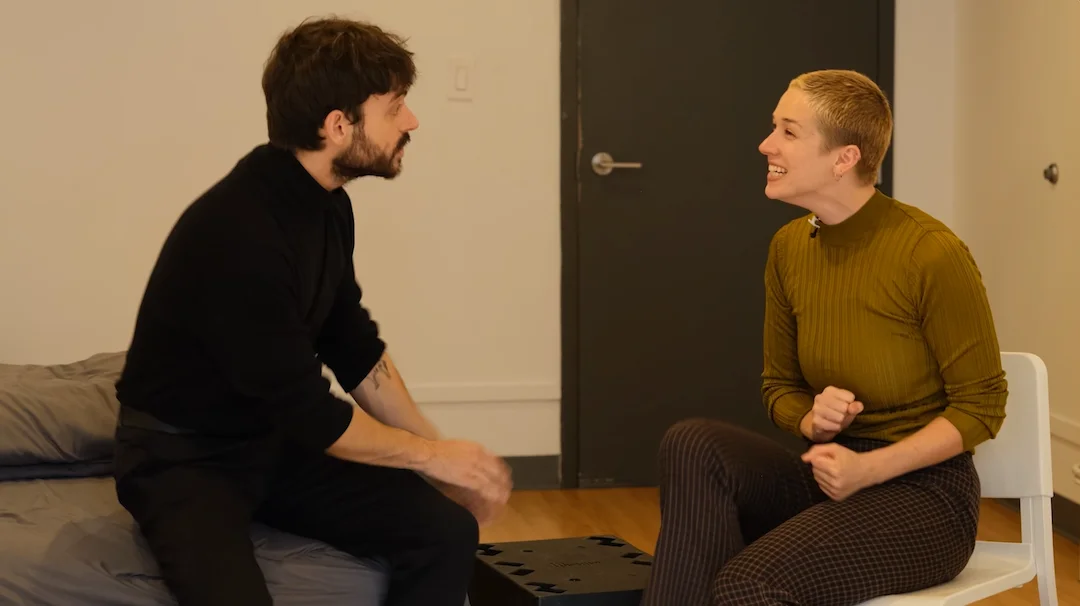
How can I rehearse alone as an actor? Do I need to?
Contributed with introspection by Alumni Allison Spence Brown featuring photos of Second Year Student Gianna Collier-Pitts / Photos by Second Year Student Zach Lane

As actors, we have a tough job.
We are tasked with keeping several balls in the air at once — all while making it appear effortless.
We must learn our lines backwards and forwards.
We must find a way to meaningfully connect with the story we are telling.
We must deliver the behavior the playwright has asked of us.
We must work from moment to unanticipated moment.
The list goes on…
So much technical work goes into creating a “natural” performance. And on top of that, we must be able to consistently repeat that performance — night after night, sometimes for months on end.
Again: tough.
Juggling this many moving parts can sometimes feel overwhelming. That’s where the solo-rehearsal comes in.

A solo rehearsal is what we do on our own before heading into contact with another artist or artists.
This isn’t necessarily a skill that comes naturally. I used to believe that I’d show up and “be in the moment” with my scene partner and the performance would take care of itself.
Wrong.
It was this thinking that had been holding me back, and keeping my work “small” for years. I thought I was taking risks, but I was operating out of fear.
Even after graduating with my BFA from NYU I often felt very hit or miss when it came to my work. I thought my success was dependent upon what kind of day I was having, if the character I was playing was enough like “me” that I felt like we could essentially be the same person, if I was wearing my lucky socks, etc etc etc. I became superstitiously precious about my work, rather than treating it as my job.
Learning tangible ways to rehearse and craft my performance on my own changed everything.

So. What exactly is a solo-rehearsal???
A solo-rehearsal is – learning your lines. (…Kind of.)
Some say learning lines is what we must do BEFORE we rehearse for the first time. Others like to be on book for awhile. Either way, learning your lines is less “part of the rehearsal” process, and more “being ready for a rehearsal” process. It’s not your partner’s responsibility to help you learn your lines.
A solo-rehearsal is – when you do your script and character analysis.
Working off the play or script as a whole, you identify: what is your character’s objective? What are they trying to accomplish in the scene / in the play as a whole? What story are you telling? What kind of person is your character? How does your character fit into the overall story?
A solo-rehearsal is – when you figure out just what the heck your character is actually talking about.
Terry encourages us to use the trick of paraphrasing. Going line by line and putting your character’s words into your own words. Then, once you know what you are talking about… start to work the playwright’s text back in slowly. You can’t act what you don’t know — and if you don’t know what you’re actually saying, the audience will pick up on it. It won’t ring true.
This trick is insanely helpful — especially when you are working with heightened language.
A solo-rehearsal is – when you take the specifics from the script and make them personal.
This is what we call “particularization”. When we particularize, we use our imaginations. We daydream. We take the information and facts from the script and personalize them so that they create behavior within us.
A solo-rehearsal is – when you set your actions.
Once you know what the scene is about, you reverse engineer how your character goes about accomplishing her objective. Are you scolding your daughter in this moment? Are you berating her? Are you guilting her? Actions are verbs that can be performed — While all of the actions I just listed may seem similar, getting as specific as possible on your actions is what will take your performance to the next level.
A solo-rehearsal is – when you get your character in your body.
Working on your characters impediments and physicality. Is your character drunk in this scene? Do they have a limp or an accent? Test these things out during your solo-rehearsal. Try on different physicality’s, etc until you land on something you love. Trust your instincts. You should go into rehearsal with your partner already having this work internalized in your body so it is second nature. This is the tip of the iceberg when it comes to what you can use a solo rehearsal for! The point is to set yourself up to succeed by making the time to craft on your own.

Finally, it is important to note — even if you set something in a solo-rehearsal, that doesn’t mean that you must stick to it. Perhaps you get into a rehearsal with your partner or a director and a new, better idea comes to you. That’s great! Take that into another solo-rehearsal and work on it. This should be fun! Now lock yourself away in a room and get crackin’!